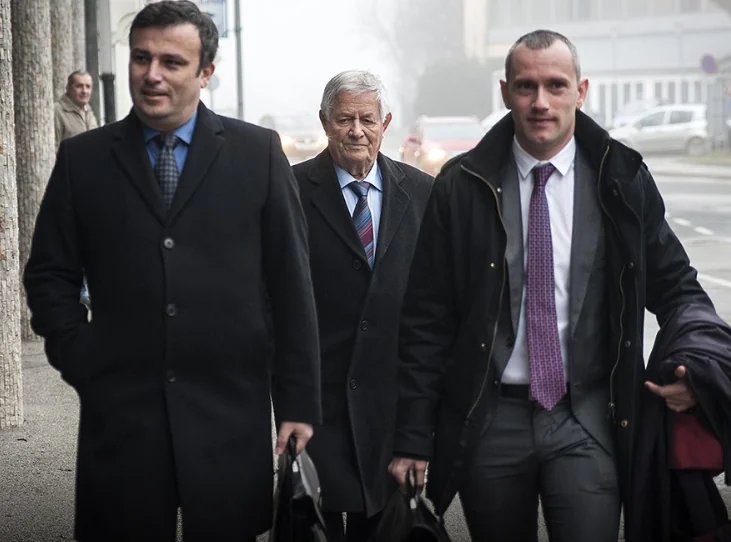Decades after it happened, a Belgian court has clarified the circumstances of the political murder of Enver Hadri, who was killed in Brussels in 1990 on the orders of the Yugoslav State Security Service – the UDBA. After a retrial, Veselin Vukotić (72) and Andrija Drašković (62) have been sentenced to life imprisonment. This case once again raises the question of responsibility for the political murders of the State Security Administration in Slovenia and the action taken by the Slovenian judiciary against those responsible.
After the conviction in Belgium, opposition MP Franc Breznik of the Slovenian Democratic Party (Slovenska demokratska stranka – SDS) reacted to the verdict on social media, pointing out that, in addition to the well-known convictions of Josip Perković and Zdravko Mustač (former employees of the Croatian Republican State Security Service during the era of the Socialist Federal Republic of Yugoslavia) in Germany, there has now also been a conviction in Belgium. He also raised the issue of accountability in Slovenia, particularly in relation to Silvo Gorenc, the former head of the Slovenian State Security Administration.
“What about Slovenia? What is the Supreme Court doing? What about the Silvo Gorenc case?” wondered MP Breznik, pointing to the pending cases and the alleged lack of will to prosecute these crimes in Slovenia.
State Security Administration’s political murders and unsolved cases
The Hadri case is just one in a series of political murders carried out by the State Security Administration against opponents of the Yugoslavian communist regime, including the high-profile 1983 murder of Croatian emigrant Stjepan Đureković in the year 1983 in Germany, for which Perković and Mustač were sentenced to long prison terms in 2016. In this case, too, justice took decades to be done.
This is a victory for all victims of the criminal regime
Enver Hadri was murdered in Brussels on the 25th of February 1990 at around 4.30 p.m. He was shot as he stopped his car at a red traffic light. The shots were fired from a car with four people inside. At the time, Hadri was providing evidence of human rights violations against Albanians in Kosovo to the European Union institutions and other international bodies.
The Croatian media outlet Jutranji list reports that the state prosecutor led the case against the defendants, while Enver Hadri’s family also participated as the injured parties. His daughter, 48-year-old lawyer Teuta Hadri, had been campaigning for justice for many years and has described the verdict as a victory for all the victims of the criminal regime. She was only 13 years old when her father was killed, and today, she is the same age as he was at the time of his liquidation.
Sokol Vlhajen, the Hardi family’s lawyer, stresses that there is no doubt that the duo is guilty – the 12-member jury has twice reached the same conclusion that there is overwhelming evidence of guilt, and they have been sentenced to life imprisonment for the crime of aggravated murder. As explained by the lawyer, material evidence was presented to confirm who ordered and who committed the murder.
The court ordered the arrest of the duo, but according to Croatian media, it is unlikely to take place as long as they are on Serbian territory. The fact is, however, that the Hadri murder represents one of the few cases in which it has been proven in court that the Yugoslavian State Security Administration killed its political opponents abroad with the help of members of the underground who were involved in organised crime. No judicial epilogue has yet been reached in Slovenia for those potentially responsible for the State Security Administration’s crimes. Silvo Gorenc, one of the most influential leaders in the Yugoslav secret service, remains untried despite years of debate and political pressure.
As a long-time researcher of Slovenian archives, Igor Omerza, MSc, explained for the media outlet Demokracija (Democracy) years ago, “the most mass murders on Slovenian soil took place immediately after the war, when OZNA – the Department for Protection of the People, which was the predecessor of the State Security Administration, participated in the mass murder of returned Slovenian Home Guard soldiers and, in other murders, of returned or captured Croatians, Germans, civilians, women and children…” No paid assassins were hired for this. Omerza pointed out that it should not be forgotten that Kardelj’s Intelligence and Security Service – VOS was responsible for inter-war political assassinations, which took place in order to eliminate potential post-war political opponents. “In addition to post-war mass murders, the Department for Protection of People – and from 1946 onwards, the State Security Administration – also carried out individual murders. If we look at the post-war period of the State Security Administration’s activities, the assassinations were carried out not within the country, but abroad,” he explained, citing two specific examples. “In the case of the murder of the Slovenian emigrant Janez Toplišek, he was tricked by paid collaborators of the State Security Administration into coming to Slovenia, where he was tried and then murdered by guards in Stara Gradiška. In the case of the murder of the Croatian student Stjepan Crnogorac, too, it was well-paid kidnappers who delivered him from Salzburg to the “UDBA-owned” Ljubljana (1972), where he then disappeared forever.” On the latter, he added that Gorenc, who was then head of the federal State Security Administration, could explain where his remains ended up.
According to him, the State Security Administration carried out the largest number of political murders abroad against Croatian emigrants. “All murders abroad were controlled and directed by the federal State Security Administration. And in this process, it was abundantly assisted by the Slovenian branch of the Administration, which participated, for example, in the preparation of the failed assassination of the Croatian Nikola Štedul (1988) and the successful murder of the Albanian Enver Hadri,” Omerza said.
A. H.


